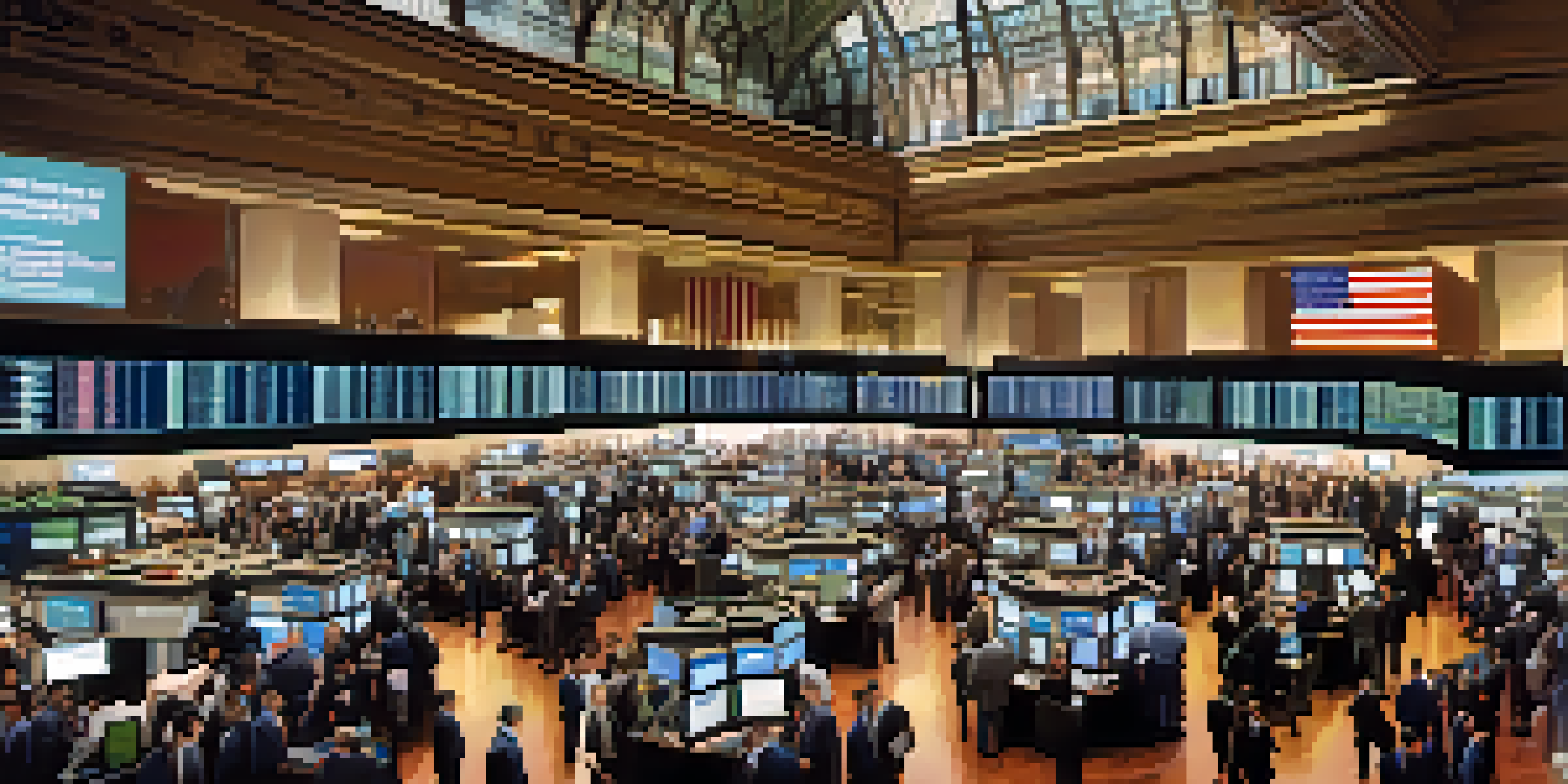The Role of Speculation in Increasing Market Volatility

What Is Speculation and Why Does It Matter?
Speculation involves making financial transactions that involve high risk but also the potential for significant returns. Investors engage in speculation to capitalize on price movements, often without thorough analysis of underlying assets. This approach can lead to rapid price changes, making it a central player in market dynamics.
In investing, what is comfortable is rarely profitable.
For example, when traders speculate on the future price of commodities like oil, their buying or selling decisions can cause immediate shifts in market prices. This creates a ripple effect, as other investors react to perceived trends, amplifying volatility. Understanding this behavior is crucial for navigating the financial landscape.
In essence, speculation is a double-edged sword; while it can drive innovation and liquidity, it also introduces unpredictability. A deeper understanding of speculation helps investors make informed decisions, balancing risk with potential rewards.
How Speculative Trading Affects Market Prices
Speculative trading can lead to rapid price increases or decreases, often disconnected from a company’s actual performance. When traders anticipate future market movements, they may buy shares in large quantities, driving prices up. Conversely, if sentiment shifts, the same stocks can plummet just as quickly, creating a rollercoaster effect in the market.

Take, for instance, the technology sector during a product launch. Speculators may drive up stock prices in anticipation of strong sales, but if the product fails to meet expectations, those prices can crash. Such scenarios underscore the fragility of market prices influenced by speculation.
Speculation Drives Market Volatility
Speculative trading can cause rapid price shifts, often disconnected from a company's actual performance, leading to market instability.
Ultimately, this behavior not only impacts individual stocks but can also lead to broader market fluctuations, affecting investor confidence and stability. Understanding this connection is vital for anyone looking to make strategic investments.
The Psychological Aspects of Market Speculation
Psychology plays a significant role in speculation, as investor emotions often drive market behavior more than fundamentals. Fear and greed can lead to herd mentality, where investors follow trends without fully understanding the underlying risks. This collective behavior can exacerbate market volatility, as seen during economic bubbles.
The market can stay irrational longer than you can stay solvent.
For example, during the dot-com bubble, many investors poured money into internet companies based on hype rather than solid financials. When the bubble burst, panic selling ensued, causing severe market fluctuations. Such incidents highlight how psychological factors can lead to irrational decision-making.
By recognizing these psychological triggers, investors can develop strategies to counteract emotional reactions and make more rational decisions. This awareness is key to mitigating risks associated with market speculation.
Speculation in Different Market Conditions
Market conditions significantly influence the role of speculation, with bull markets often encouraging more speculative behavior. In a rising market, investors feel more confident, leading them to take larger risks in hopes of higher returns. This can result in inflated asset prices, making the market more prone to sudden corrections.
Conversely, in bear markets, speculation may decrease as investors become more cautious. However, even in downturns, some traders might engage in short selling, betting that prices will fall further. This can create additional volatility, as the market reacts to both selling pressure and speculative bets.
Psychology Influences Investor Behavior
Investor emotions, such as fear and greed, can lead to herd mentality, exacerbating market volatility and resulting in irrational decision-making.
Understanding how different conditions affect speculation helps investors navigate their strategies effectively. Adapting to changing market environments is essential for managing risk and capitalizing on potential opportunities.
The Role of Technology in Speculative Trading
Technology has transformed speculation, enabling high-frequency trading and algorithmic strategies that can execute trades in milliseconds. This rapid trading can amplify market movements, leading to increased volatility as algorithms react to price changes faster than human traders. As a result, markets can experience sharp spikes or drops within short time frames.
For instance, during the flash crash of 2010, automated trading systems contributed to a sudden drop in the Dow Jones Industrial Average, illustrating the impact of technology on market dynamics. Such events raise questions about the stability of markets heavily influenced by speculative practices.
As technology continues to evolve, so does the landscape of speculation. Investors must stay informed about these developments and consider their implications for market behavior and volatility.
Regulatory Responses to Speculation and Volatility
In response to increased speculation and its contribution to market volatility, regulatory bodies have implemented measures to stabilize financial markets. These regulations aim to enhance transparency, reduce excessive risk-taking, and protect investors from potential pitfalls. However, finding the right balance between regulation and market freedom remains a challenge.
For example, circuit breakers were introduced to pause trading during extreme market fluctuations, allowing investors to reassess their positions. While these measures can help prevent panic-selling, they may also create uncertainty about market dynamics.
Regulation Aims to Stabilize Markets
Regulatory measures, like circuit breakers, are implemented to manage speculation and protect investors, although they may also introduce new uncertainties.
Regulatory responses are crucial for maintaining market integrity, but they can also have unintended consequences. Investors must stay informed about regulatory changes and their potential impacts on speculative trading.
Strategies to Navigate Speculation and Volatility
Investors can adopt various strategies to navigate the challenges posed by speculation and market volatility. Diversification is one effective approach, as spreading investments across different asset classes can reduce risk. By not putting all eggs in one basket, investors can better weather market fluctuations.
Another strategy is setting clear investment goals and sticking to them, regardless of market noise. This disciplined approach helps investors avoid impulsive decisions driven by speculation. For example, having a long-term investment strategy can provide a buffer against short-term volatility.

Finally, staying informed and continuously educating oneself about market trends can empower investors. Knowledge is a powerful tool, enabling individuals to make informed decisions and mitigate the risks associated with speculation.